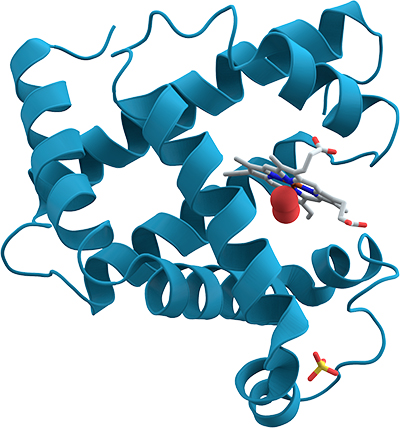MCP: Study shows long-term effects of weight loss on the proteome
As hard as weight loss is, long-term maintenance can be even more of a challenge. But in the journal Õµ≈ƒÕµø˙ & Cellular Proteomics indicates that the hard work of maintaining weight loss can pay previously unknown health dividends.
 Proteomics researchers found that many plasma proteins, such as myoglobin, shown at left, increase in nonenzymatic glycation after patients lose weight. It takes six months to a year of sustained weight loss for glycation to drop below baseline levels. PDB / S.E. Phillips
Proteomics researchers found that many plasma proteins, such as myoglobin, shown at left, increase in nonenzymatic glycation after patients lose weight. It takes six months to a year of sustained weight loss for glycation to drop below baseline levels. PDB / S.E. Phillips
Using plasma samples from a study that followed people as they lost weight and worked to keep it off, researchers at a Swiss proteomics company called Biognosys, in collaboration with a team at Nestl√©, studied how weight loss affected participants’ blood proteome. They observed that while chronic inflammation subsides immediately after weight loss, it takes some time for added beneficial effects to kick in.
The diet, obesity and genetics study, or for short, was designed to test the benefit of various diets in maintaining weight loss. Among the 550 participants who lost 8 percent or more of their starting weight and stayed in the study for another six months, researchers , those who followed a high-protein, low-glycemic-index diet were most successful at keeping it off.
More recently, researchers at led by Lukas Reiter used a streamlined proteomics approach to analyze patient plasma samples from the start of the study, the end of its eight-week weight-loss phase, and six and 12 months into the maintenance phase. Consistent with other weight-loss studies, the team saw a dramatic, lasting drop in inflammatory signaling linked to atherosclerosis and an increase in lipid metabolism soon after weight loss.
Because of the depth of their proteome coverage, the Biognosys researchers could add a look at protein glycation. Nonenzymatic glycation occurs when high concentrations of sugar react with proteins in the plasma. Many of the glycated proteins that changed significantly during weight loss, including albumin, myoglobin and some apolipoproteins, were unexpectedly more abundant after the study’s initial weight-loss phase. It took more than six months on the weight-maintenance diet for those glycated proteins to drop back below their baseline levels. Because glycated proteins can activate the immune system, the researchers wrote, the effect of longer-term weight loss is positive.
In future studies, the researchers who own the data hope to move from looking at the whole cohort’s proteome to correlating each study participant’s outcomes with the composition of that individual’s proteome at baseline in search of biomarkers that could help predict how future dieters will fare. Meanwhile, the Biognosys team wants to use its analytic abilities to power high-throughput proteomics for clinical trials.
Enjoy reading ASBMB Today?
Become a member to receive the print edition four times a year and the digital edition weekly.
Learn moreGet the latest from ASBMB Today
Enter your email address, and we’ll send you a weekly email with recent articles, interviews and more.
Latest in Science
Science highlights or most popular articles

Transforming learning through innovation and collaboration
Neena Grover will receive the William C. Rose Award for Exemplary Contributions to Education at the 2025 ASBMB Annual Meeting, April 12–15 in Chicago.

Guiding grocery carts to shape healthy habits
Robert “Nate” Helsley will receive the Walter A. Shaw Young Investigator in Lipid Research Award at the 2025 ASBMB Annual Meeting, April 12–15 in Chicago.

Quantifying how proteins in microbe and host interact
‚ÄúTo develop better vaccines, we need new methods and a better understanding of the antibody responses that develop in immune individuals,‚Äù author Johan Malmström said.

Leading the charge for gender equity
Nicole Woitowich will receive the ASBMB Emerging Leadership Award at the 2025 ASBMB Annual meeting, April 12–15 in Chicago.

CRISPR gene editing: Moving closer to home
With the first medical therapy approved, there’s a lot going on in the genome editing field, including the discovery of CRISPR-like DNA-snippers called Fanzors in an odd menagerie of eukaryotic critters.

Finding a missing piece for neurodegenerative disease research
Ursula Jakob and a team at the University of Michigan have found that the molecule polyphosphate could be what scientists call the “mystery density” inside fibrils associated with Alzheimer’s, Parkinson’s and related conditions.

